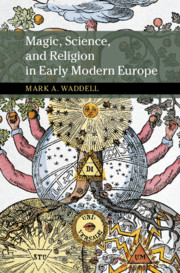Book contents
- Magic, Science, and Religion in Early Modern Europe
- New Approaches to the History of Science and Medicine
- Magic, Science, and Religion in Early Modern Europe
- Copyright page
- Dedication
- Contents
- Figures
- Acknowledgments
- Introduction
- 1 Hermeticism, the Cabala, and the Search for Ancient Wisdom
- 2 Witchcraft and Demonology
- 3 Magic, Medicine, and the Microcosm
- 4 A New Cosmos
- 5 Looking for God in the Cosmic Machine
- 6 Manipulating Nature
- 7 A New World?
- Conclusion
- Bibliographical Essays
- Index
6 - Manipulating Nature
Experiment and Alchemy in the Scientific Revolution
Published online by Cambridge University Press: 22 January 2021
- Magic, Science, and Religion in Early Modern Europe
- New Approaches to the History of Science and Medicine
- Magic, Science, and Religion in Early Modern Europe
- Copyright page
- Dedication
- Contents
- Figures
- Acknowledgments
- Introduction
- 1 Hermeticism, the Cabala, and the Search for Ancient Wisdom
- 2 Witchcraft and Demonology
- 3 Magic, Medicine, and the Microcosm
- 4 A New Cosmos
- 5 Looking for God in the Cosmic Machine
- 6 Manipulating Nature
- 7 A New World?
- Conclusion
- Bibliographical Essays
- Index
Summary
Historians consider the “Scientific Revolution” of the sixteenth and seventeenth centuries the period in which the foundations of modern scientific practice and methodology first took shape. Francis Bacon (1561-1626), sometimes known today as the creator of the scientific method, inspired the formation of the first scientific societies, including the Royal Society of London and the French Académie Royale des Sciences, and their members made experiment and empiricism central to the study of nature. More recently, however, historians have had to wrestle with an interesting conundrum: some of those long hailed as pioneers of scientific experimentalism, such as Robert Boyle (1627-1691) and Isaac Newton (1643-1727), were also committed alchemists. Their dedication to this mysterious and misunderstood art led some modern biographers to deny or even suppress evidence of their alchemical pursuits. Yet, alchemical ideas were central to how Boyle, Newton, and others understood nature. In fact, Newton’s groundbreaking scientific achievements owe a particular debt to alchemical theories, without which his revolutionary vision of the cosmos would not have existed.
- Type
- Chapter
- Information
- Magic, Science, and Religion in Early Modern Europe , pp. 161 - 188Publisher: Cambridge University PressPrint publication year: 2021

